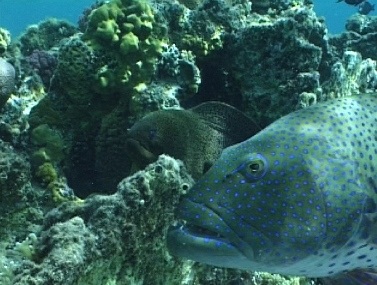Redouan Bshary
My research focus is on cooperation within and between species (mutualism). I aim to test game theoretic models and to refine them in collaboration with theoreticians. Furthermore, I am interested in links between a game theoretic approach, animal cognition and behavioural endocrinology. A major future topic will be decision making in the context of social strategies.
The cleaning mutualism between the wrasse Labroides dimidiatus and other reef fish has been and will continue to be the main model system. These cleaners remove ectoparasites from client reef fish but prefer to eat mucus, which constitutes cheating. We currently use a comparative approach that includes another cleaner wrasse L. bicolor, a species that, in contrast to L. dimidiatus, lacks cleaning stations and thus makes it hard for the clients to achieve a repeated game. Cleaning gobies of the Caribbean are interesting because they actually prefer to cooperate by eating ectoparasites rather than client mucus. We compare these highly specialized cleaner species to a variety of facultative cleaners and non cleaning wrasses to uncover the causes/consequences of cleaning on cooperation, cognition and physiology.
In addition, I have worked on predator-prey relationships in my PhD study on arboreal primates in the Ivory Coast, and I currently investigate a variety of cooperative hunting systems in the Red Sea and on Lizard Island, Australia. Interspecific collaborative hunting between groupers and moray eels is interesting because of the communicative aspects, which include gestures. Yellow goatfish hunt in groups and are highly coordinated. Both systems can be subjected to experiments in the laboratory.
A further project focuses on the interactions between sabre tooth blennies and their reef fish victims out of which the blennies bite bits of flesh. These interactions interest me in particular as the victims may punish the blennies but face the tragedy of the commons problem with their conspecifics who also benefit from any punishment action against the blenny without bearing the costs of punishment. Thus, this project deals with social dilemmas and how they can be solved under natural conditions. We recently conducted lab experiments in Egypt.
We are also about to complete two more exotic projects. The first is a collaboration with Cris Kuhlemeier on a flowering plant-pollinator mutualism to understand why plants (usually) offer nectar rather than trying to save the energy for other tasks. We produced crossing lines of Petunia plants that offer less nectar than usual and let their natural
pollinators interact with a mixed population to look for any negativeconsequences of reduced nectar provisioning. The second project is on social behaviour and cognition in wild corvids (rooks and crows) in the Canton of Neuchâtel. Some publications will come out of this project but I recommend any colleague interested in staging a similar project to contact us in order to get some ideas about potential challenges.
Finally, I returned partly to my primatological PhD roots. In collaboration with Prof Sarah Brosnan we compare cleaner wrasse to various primates in order to test the specificity of selection on social intelligence. In addition, I officially lead a Sinergia project financed by the Swiss Science Foundation to study social strategies and cognition in vervet monkeys in South Africa. Collaboration partners are Carel van Schaik (University of Zürich), Andy Whiten (University of St.-Andrews) and Klaus Zuberbühler (University of Neuchâtel). The ‘true’ leader and soul of the project is Erica van de Waal (University of Zürich). The project is generously hosted by Justin O’Riain (University of Cape Town).
University studies and diplomas obtained
10/1985 - 11/1991: Study of Biology at Ludwig-Maximilian-University in Munich/Germany. Master thesis at the Max-Planck-Institute for Behaviour and Physiologie/Seewiesen (further abbreviated as MPIV), Supervisor: Prof. Dr. Jürg Lamprecht.
1/1992 - 10/1995: Dissertations/theses Ph.D. at the MPIV, first supervisor: Prof. Dr. Wolfgang Wickler; second supervisor: Prof. Dr. Gerhard Neuweiler. PhD degree on the 16/10/1995, awarded by the Ludwig-Maximilian-University in Munich.
Professional/research experience
10/1995 - 8/1997: Post-doc at the MPIV, continuation of the PhD research on arboreal monkeys in the Taï National Park/Ivory Coast.
9/1997-8/2000: Start of own project financed by the German Science Foundation (DFG grants BS 2/2-1 to BS 2/2-4) on marine cleaning symbiosis at Ras Mohamed National Park, Egypt and on Lizard Island, Australia.
9/2000-8/2002: Marie Curie grant from the European Union to work with Dr. Rufus Johnstone at Cambridge, U. K., continuing the work on cleaning symbiosis (grant MCFI-1999-00473).
8/2002: Nico Tinbergen award from the Ethological Society (equivalent to the ASAB young scientist award)
9/2002 -6/2003: Research project collaboration between the MPIV and the Cambridge Zoology Department on game theoretic modelling, cleaning symbiosis and on interspecific cooperative hunting between groupers and moray eels (DFG grant BS 2/2-5)
7/2003-7/2004: Lecturer in behavioural ecology at the School of Biological Sciences at Liverpool University
Since 10/04: Professor in behavioural ecology at the University of Neuchâtel
Important tasks within the scientific community
Director of the Institute of Biology at Neuchâtel (2008-2012)
Secretary of the Decanat of the Faculty of Sciences/Neuchâtel
President of the Ethological Society (2010-2012)
Associate editor of the journal Proceedings of the Royal Society Series B (2006-2012)
Member of the Swiss Science Foundation Ambizione commission
Associate Board member of the Australian Research Council
Review editor of the journal Ethology (since 2015)
Dean of the faculty of sciences at Neuchâtel (since 8/2016)
Link to Google Scholar entry


Redouan Bshary
Professeur ordinaire
room: D 130
adresse:
Université de Neuchâtel
UniMail
Institut de Biologie
Eco-Ethologie
Rue Emile-Argand 11
CH-2000 Neuchâtel
Tel. +41 32 718 30 05
Fax +41 32 718 30 01





